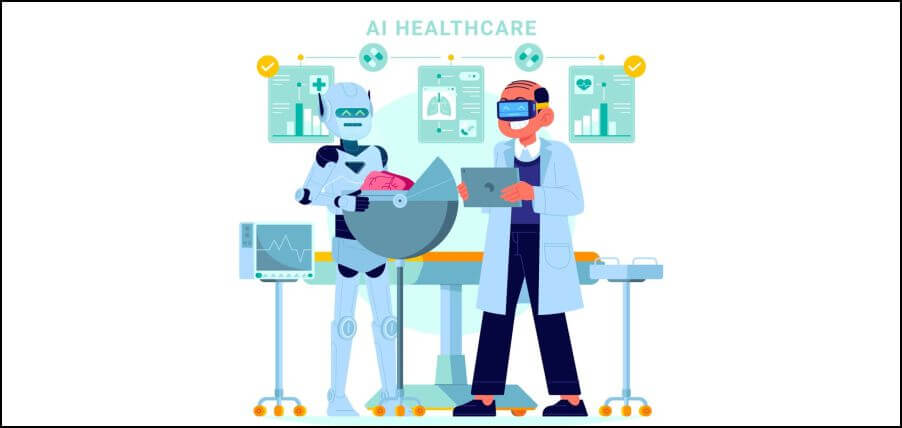Medicine is typically not a field that people associate with AI. Even though it is heavily technology-reliant, the question of how to use AI in healthcare is the one we are still to answer to a full extent. One thing we know for sure — technology can be used to analyze large amounts of information such as genetic data, medical records, and diagnostic testing. What else do we know about the application of AI in the field?
The Use of Artificial Intelligence in Healthcare
What is AI used for in healthcare? Personalized treatment plans, patient monitoring, diagnosis support, and predictive analytics to name a few. Evaluating patient data allows these systems to identify early indicators of conditions like cancer or heart disease and make sure medical professionals take action sooner and diagnose patients more precisely.
AI in healthcare applications spans many domains, including administrative tasks like patient scheduling and clinical activities such as diagnosing conditions or predicting treatment outcomes. With the help of SaaS development services, treatments can be tailored to individual patients based on their genetic makeup, lifestyle, and previous medical history, which increases the chances of successful outcomes.
Where is AI Used in Healthcare?
Clinical and administrative tasks currently incorporate AI. Here are a few AI applications in healthcare examples:
| Application Area | How AI is Used |
| Diagnostics | Aids in the rapid and more precise diagnosis of diseases including diabetes, cancer, and heart issues by identifying them in medical photographs. |
| Personalized medicine | Systems use lifestyle, medical history, and genetic data to generate individualized therapy regimens. |
| Predictive analytics | Based on past data, algorithms forecast health hazards including heart attacks and strokes, and enable preventive measures. |
| Patient monitoring | Tools monitor vital indicators, keep tabs on patient progress, and anticipate potential issues. |
These are just some of the many AI in healthcare use cases. They demonstrate how it is transforming patient care and simplifying medical processes.
Examples of AI in Healthcare
Radiology
Radiology tools examine MRIs, CT scans, and X-rays to find anomalies, fractures, and other diseases. It is used, for example, to interpret medical images by IBM Watson Health.
Genetics
Artificial intelligence applications in healthcare help doctors evaluate genetic data and develop personalized treatment regimens. This is especially useful for patients with uncommon genetic illnesses or cancer.
Drug Discovery
By mimicking chemical interactions, it speeds up the process of finding prospective medication candidates and illustrates how AI can be used in healthcare to expedite drug discovery. Forecasting how various chemicals react and interact at the molecular level helps researchers cut down on the time and expense of creating novel medications.
Virtual Assistants
Is artificial intelligence used in healthcare for something other than medicine? Of course! Babylon Health and other virtual assistants offer consultations, aid patients with minor medical concerns, and offer advice on what to do next. These artificial intelligence healthcare examples show how AI improves productivity and precision.
How AI Helps in Healthcare
- Quicker diagnosis: It can identify diseases like cancer, heart disease, and neurological illnesses early on and evaluate medical images and records far more quickly than human doctors.
- Personalized treatment plans: Using information about each patient, technology assists in developing personalized treatment programs.
- Predictive analysis to mitigate risks: With past patient data, sophisticated computers forecast possible health hazards such as heart attacks or strokes.
AI Tools in Healthcare: Key Technologies
| Tool | Function |
| Natural Language Processing (NLP) | Helps process and interpret unstructured data like medical records, doctor’s notes, and patient histories to gain insights. |
| Machine learning algorithms | Used to predict patient outcomes, recommend treatments, and detect diseases based on data analysis. |
| Computer vision | Analyzes medical imaging data, such as MRIs or X-rays, to identify anomalies or conditions such as tumors or fractures. |
Application of Artificial Intelligence in Healthcare
It improves clinical results, lowers human error, and streamlines hospital processes. For instance, it can control bed occupancy, forecast patient intakes, maximize hospital resources, and guarantee that medical staff is distributed as efficiently as possible.
How AI is used in healthcare determines how well doctors make decisions and how quickly they can assist patients. It allows them to focus more on their actual work and less on handling enormous volumes of data.
How AI Works in Healthcare
Doctors and patients can better understand AI services in healthcare when they are aware of its applications. These systems function by analyzing vast amounts of data and finding patterns that are hard for people to notice. For instance, AI algorithms in predictive analytics might examine historical patient data to forecast future health hazards, such as the chance of a heart attack or stroke.
Additionally, it is useful in fields like genetic testing, where algorithms can use a patient’s DNA to determine the best course of therapy. This application of artificial intelligence in healthcare is critical in personalized medicine, as it leads to more effective and customized therapies.
Healthcare AI Solutions and Future Prospects
As technology advances, we may anticipate even more AI in healthcare examples that offer a deeper understanding of patient health and enable more individualized and efficient therapies. The quality of modern medicine is raised by automating repetitive tasks, which frees up time for physicians and nurses to concentrate on providing direct patient care.


